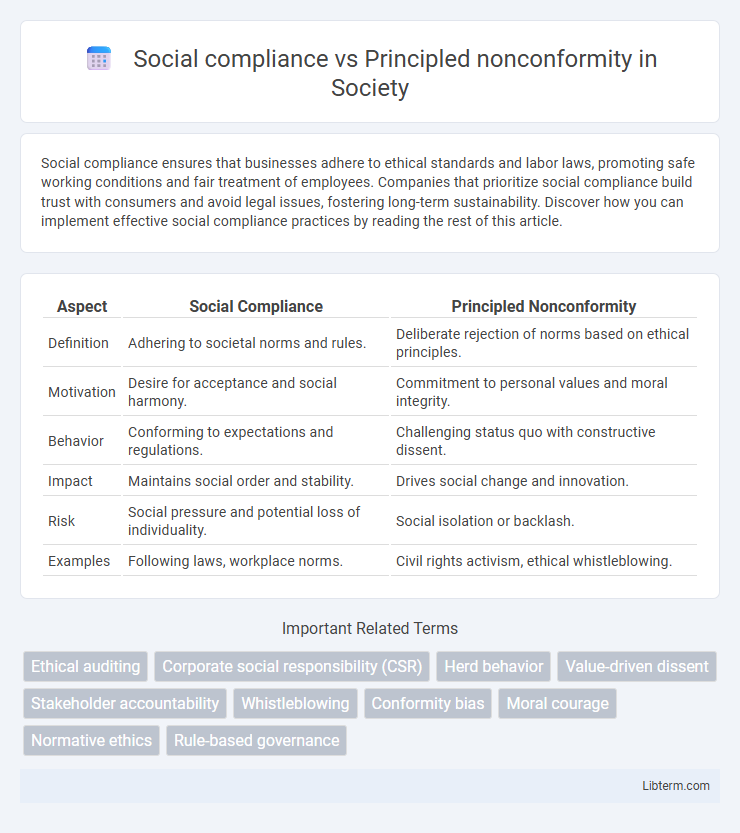Social compliance ensures that businesses adhere to ethical standards and labor laws, promoting safe working conditions and fair treatment of employees. Companies that prioritize social compliance build trust with consumers and avoid legal issues, fostering long-term sustainability. Discover how you can implement effective social compliance practices by reading the rest of this article.
Table of Comparison
| Aspect | Social Compliance | Principled Nonconformity |
|---|---|---|
| Definition | Adhering to societal norms and rules. | Deliberate rejection of norms based on ethical principles. |
| Motivation | Desire for acceptance and social harmony. | Commitment to personal values and moral integrity. |
| Behavior | Conforming to expectations and regulations. | Challenging status quo with constructive dissent. |
| Impact | Maintains social order and stability. | Drives social change and innovation. |
| Risk | Social pressure and potential loss of individuality. | Social isolation or backlash. |
| Examples | Following laws, workplace norms. | Civil rights activism, ethical whistleblowing. |
Understanding Social Compliance: Definition and Dynamics
Social compliance refers to the adherence to established social norms, rules, and expectations within a community or organization, guiding behavior to maintain harmony and order. It involves conforming to collective values and standards, often driven by external pressures such as laws, policies, or social consequences. Understanding the dynamics of social compliance reveals how conformity shapes group cohesion, influences individual decision-making, and balances personal autonomy with societal control.
Principled Nonconformity: Meaning and Motivations
Principled nonconformity involves deliberately challenging established norms and rules based on ethical beliefs and personal integrity rather than mere rebellion. It reflects a commitment to values that may conflict with social or organizational standards, motivated by a desire to promote justice, innovation, or authenticity. This form of nonconformity prioritizes meaningful change and moral conviction over passive compliance or superficial dissent.
Social Compliance in Everyday Life
Social compliance in everyday life involves adhering to societal norms, rules, and expectations to maintain harmony and avoid conflict. This behavior is often driven by the desire for social acceptance, fear of rejection, or the need to conform to group standards. Following established social codes facilitates predictable interactions and fosters a sense of community cohesion.
The Roots of Principled Nonconformity
Principled nonconformity stems from a deep commitment to personal ethics and values that challenge mainstream social norms and conventional compliance standards. It originates in critical self-reflection and resistance to external pressures that promote conformity at the expense of individual moral integrity. This root cause drives individuals or groups to prioritize authentic expression and justice over mere adherence to established social rules.
Psychological Factors Influencing Compliance and Nonconformity
Psychological factors influencing social compliance include conformity pressure, desire for social acceptance, and cognitive dissonance reduction, which drive individuals to align with group norms. Principled nonconformity arises from intrinsic motivation, strong personal values, and psychological reactance, enabling individuals to resist conformity despite social pressures. Self-efficacy and moral conviction critically shape whether a person complies or nonconforms in social contexts.
Social Compliance vs Principled Nonconformity: Key Differences
Social compliance involves adhering to established norms, rules, and regulations to maintain order and meet societal expectations. Principled nonconformity, on the other hand, is the deliberate choice to challenge or reject these norms based on ethical or moral convictions. The key difference lies in compliance aligning behavior with external standards, whereas principled nonconformity prioritizes personal integrity and critical evaluation over conformity.
Benefits and Risks of Social Compliance
Social compliance enhances organizational reputation and ensures adherence to legal and ethical standards, reducing risks of fines and consumer backlash. It promotes a safer work environment, improves employee morale, and fosters trust with stakeholders through consistent governance. However, rigid social compliance may limit innovation and lead to superficial adherence without addressing deeper systemic issues.
Advantages and Challenges of Principled Nonconformity
Principled nonconformity fosters innovation and authenticity by encouraging individuals and organizations to challenge norms and create unique solutions, leading to competitive advantages and cultural evolution. Challenges include potential social isolation, resistance from established systems, and the risk of misalignment with mainstream expectations, which can hinder acceptance and collaborative opportunities. Navigating these difficulties requires resilience and strategic communication to maintain integrity while influencing positive change.
Impact on Society: Compliance and Nonconformity in Action
Social compliance promotes societal order by encouraging adherence to established norms and regulations, which enhances predictability and stability in communities. Principled nonconformity drives social progress by challenging unjust rules and fostering innovation, often leading to transformative changes and increased social awareness. The dynamic interplay between compliance and nonconformity shapes social evolution, balancing order with necessary reform for sustained societal development.
Fostering Balance: When to Comply and When to Dissent
Fostering balance between social compliance and principled nonconformity requires understanding the context in which rules serve collective well-being versus situations demanding ethical dissent. Compliance supports organizational harmony and legal adherence, while principled nonconformity drives innovation, justice, and social progress by challenging unjust norms. Effective leadership and critical thinking enable individuals to discern when adherence maintains stability and when dissent promotes meaningful change.
Social compliance Infographic

 libterm.com
libterm.com